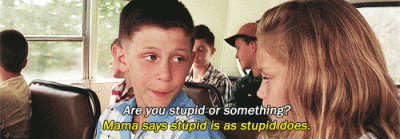
Critical thinking is one of those skills we pretend to consider to be desirable for citizens in a democracy. Theoretically, students are educated in this skill as part of the k-12 curriculum. In the beginning, students would be provided a document or primary source and then asked questions about it. Initially, all the questions asked can be answered solely from the data presented. No additional knowledge is required.
Over time, the process becomes more challenging. There may be multiple related documents such as the speeches of one individual. There may be multiple and contradictory documents such as opposing speeches. Students may have the option to draw on knowledge not presented in the class. There may be open-ended questions. Of course, there may be open questions about the War of Northern Aggression or should presidents be able to say they can kill someone in broad daylight on 5th Avenue and get away with it?
Situations requiring critical thinking occur frequently in the real world without always being designated by that term. For example, jurors are expected to be able to weigh often contradictory and incomplete data and arrive at a verdict. Voters also are asked to think but we know loyalty to one’s team often takes precedence over anything else.
I started thinking more about this issue on May 24 based on the front page of the New York Times, the newspaper that is home-delivered to me and read with two hands the way newspapers are supposed to be read. Three articles on the front page in particular caught my attention as examples of the way critical thinking does and does not occur.
Deep in Desert, Iran Quietly Works on Missiles: Researchers See Sign That an Old Program Has Been Revived
This article was good old-fashioned research and digging in the tradition of Sherlock Holmes to discover the truth. In fact, the article states some American weapon researchers watching Iranian TV “stumbled on a series of clues that led them to a startling conclusion.” It turns out that a second and secret facility in the remote Iranian desert had been constructed for the purpose of extending the range of Iranian missiles beyond the Middle East. The construction of this site was contrary to the public announcements of Iranian officials. The purpose here is not to detail the investigatory work which went into piecing the discovered data together, but to acknowledge the process. The situation was not a jury case where people are presented with a problem to resolve. Instead, it reflects an accidental initiative due to the chance of well-trained and knowledgeable people being alert to what was going on around them (in contrast, for example, to clueless wrestling coach Jim Jordan, who asserts he had no idea what was going on around him, an apparently chronic condition – added information not in the article).
Sandy Hook Suits Fabulist and Online ‘Post Truth’ Culture
This article from the same front page is about Alex Jones labeled “an online conspiracy theorist.” Alex Jones employs a method of investigation the exact opposite of Sherlock Holmes. In this instance, the question was his claim that the so-called Sandy Hook massacre was really an elaborate government-invented hoax supported by “gun-grabbers.” In other words, in the battle over the Second Amendment a staged event was perpetrated on the American people at this elementary school (just as it would be years later at a Florida high school – added information not in the article). The reporter notes that this fabulist has been praised as having an “amazing” reputation by the president of the United States (who has trumped over 3000-and-counting times since he became president –added information not in the article). Now the parents of the murdered children are seeking to hold accountable this individual in our “post-truth” world.” Subsequently (July 3 in my hard copy), the same reporter wrote an article “Lawyers of Neo-Nazi to Defend Fabulist.” More recently, CNNMoney reported on July 26: , Facebook suspended the personal profile of controversial InfoWars founder Alex Jones on Thursday, and removed four videos associated with his namesake page and that of InfoWars, a spokesperson for the social media company said.
The classroom activity in this example is to determine whether or not Alec Jones is telling the truth. As part of critical thinking skills, a student here might draw on an almost identical scenario involving a suit against Fox News and America First Media Group. These suits derive from the concoction of the Seth Rich conspiracy hypothesis: he leaked Democratic emails during the 2016 American presidential election. One is in awe on how Sean Hannity was able to piece together this story that none of the U.S. intelligence organizations were able to discover. Truly he has a beautiful mind. For students and voters seeking the truth, there is an excellent example to observe how the conspiratorial mind works in contrast to the weapons researchers in the previous example.
All Must Rise for Anthem, NFL Insists: Players Can Stand or Stay in Locker Room
With this type of issue, one moves from the more factual ones to the more open-ended one. The task here is not to determine whether or not Iran built a secret facility to improve missile range or whether Alex Jones (and Sean Hannity) should be held accountable for their concoctions, but what decision should be made on a cultural/social issue. The United States was born in debate. Our founders debated whether or not we should declare our independence. When we succeeded, they debated how we should govern ourselves. The writings from those debates as well as they documents they produced are part of American history studied not just at the k-12 level but into adulthood. In this issue, adult citizens have the opportunity to avail themselves of the great debates of American history. It could be considered a teachable moment for an intelligent discussion. I am sure our President is eager to lead such a discussion if only Fox and Friends would present the information to him. That way it wouldn’t just be a professional wrestling arena scrum as it is at present.
The critical thinking skills noted above have real-world implications. The three events in the articles all involve actions to be taken or not taken. What should the United States do about the secret facility Iran built to develop missile range? Should people be held accountable when they make up stories? What will happen in the NFL this season?
I raise these point because there are some serious political questions to be asked and answered on a legal basis in the national arena. We are witnessing the birth and development of source documents that will become lesson plans, essay questions, and term papers in the future perhaps even in law schools as well as in history and government classes. We have the opportunity to examine a series of documents and observe how different people responded and interpreted the exact same material.
The leading examples in question so far are:
1. The Nunes 4-page memorandum
2. The Senate testimony of Don, Jr.
3. The FISA applications
The Nunes and FISA documents provide excellent examples for a critical thinking exercise. In both cases, the existence and contents of the documents are not in question … although full disclosure of the latter has not occurred as of the time of this writing. In both cases, the interpretations of these documents are available and not in question. The blogs, op-ed pieces, media interviews, late-night comedian rants all exist for future students in a critical thinking class to examine.
Those students will discover that people today have responded to the exact same documents with diametrically contrary interpretations.
1. According to one view, these documents reveal one of the greatest corruption scandals in the history of the United States. They provide proof positive of the Deep State. For some of the fiercest advocates of this conspiracy theory, these documents vindicate the months of investigation into the workings of the Deep State. The entire witch hunt is based on unverified Russian lies fed to a Democrat-paid for spy. Ironically, Sean Hannity has admitted that he no more has proof of this hypothesis than Alec Jones has for any of his hypotheses. In fact, Hannity has urged Robert Mueller, witch hunter supreme, to do his patriotic duty, and prove that the real collusion was between the Russians and the Democrats just as the President claims. Hannity can’t prove that the Russians provided Steele with any information – he wants Mueller to do that. Hannity can’t prove that the information is lies – he wants Mueller to do that. Hannity doesn’t know that the information is unverified – he wants Mueller to do that…without realizing that Mueller may already have proven whether much of it is verifiable or not. On the Bulltrump network, this passes for the application of critical thinking skills. It has been exceedingly successful with one segment of the American population.
2.According to the second view, these documents are nothingburgers. They demonstrate two things: professional government officials at work performing their jobs in a responsible matter and the willingness of Flying Monkeys to see what they need to see and do what they need to do to prevent Robert Mueller, witch hunter supreme, from being successful.
Over time, as additional information becomes available and additional people are indicted, the material for this classroom exercise examining the interpretations of the exact same documents will increase.
A similar development transpired with the testimony of Don Jr. On one hand, his masterful testimony confirmed that there was no collusion or obstruction and obviously he had not perjured himself. On the other hand, the testimony seemed useless he was setting himself for a perjury charge.
The performance of Scott Jennings on CNN is instructive. He is a Republican but not a Flying Monkey. He took pains to repeatedly assert that people under oath should be given the benefit of the doubt and the testimony should be accepted as true. Here is where I fault Don Lemon for the inadequate job he did as a moderator. In response to Jennings protestations about a person being under oath, he should have asked Jennings to think like a juror where every witness is under oath. He should have asked Jennings to do some critical thinking where he can draw on additional information to render a verdict.
As a juror, what should Jennings have noticed about the testimony had he decided to think about it?
1. The witness had been counseled to say he didn’t remember again and again so he wouldn’t fall into the perjury trap.
2. The witness had been counseled to affirm that the only thing he did remember were the “facts” that revealed this was all a witch hunt: he never spoke to his father about it and the meeting was a nothingburger.
3. The odds are Mueller knows to whom Don Jr. made the phone call after the meeting.
4. The odds are Mueller has testimony from Hope Hicks who definitely does not want to go to jail ever.
5. The odds are Mueller has additional and alternate testimony from the other attendees at the meeting.
6. And everybody knows, Don Jr. ‘s father always knows what is going on in his building. The idea that he didn’t is prima facie absurd.
And all this is even before the Fixer decided to tell the truth.
Facebook has offered some “Tips to Spot False News.” The last one is:
Some stories are intentionally false. Think critically about the stories you read, and only share news that you know to be credible.
Imagine if this rule applied in the White House.






